HOW TO
START A HOUSING CO-OPERATIVE
Interested in starting a housing co-operative? We’ve prepared a guide that explains the major steps and questions you’ll need to answer along the way. The key challenge is one of resources: creating an organization is quite straightforward, but acquiring or developing buildings is not.
Please note our disclaimers and limitations. CHF BC does not provide consultation services for groups wishing to establish new housing co-ops.
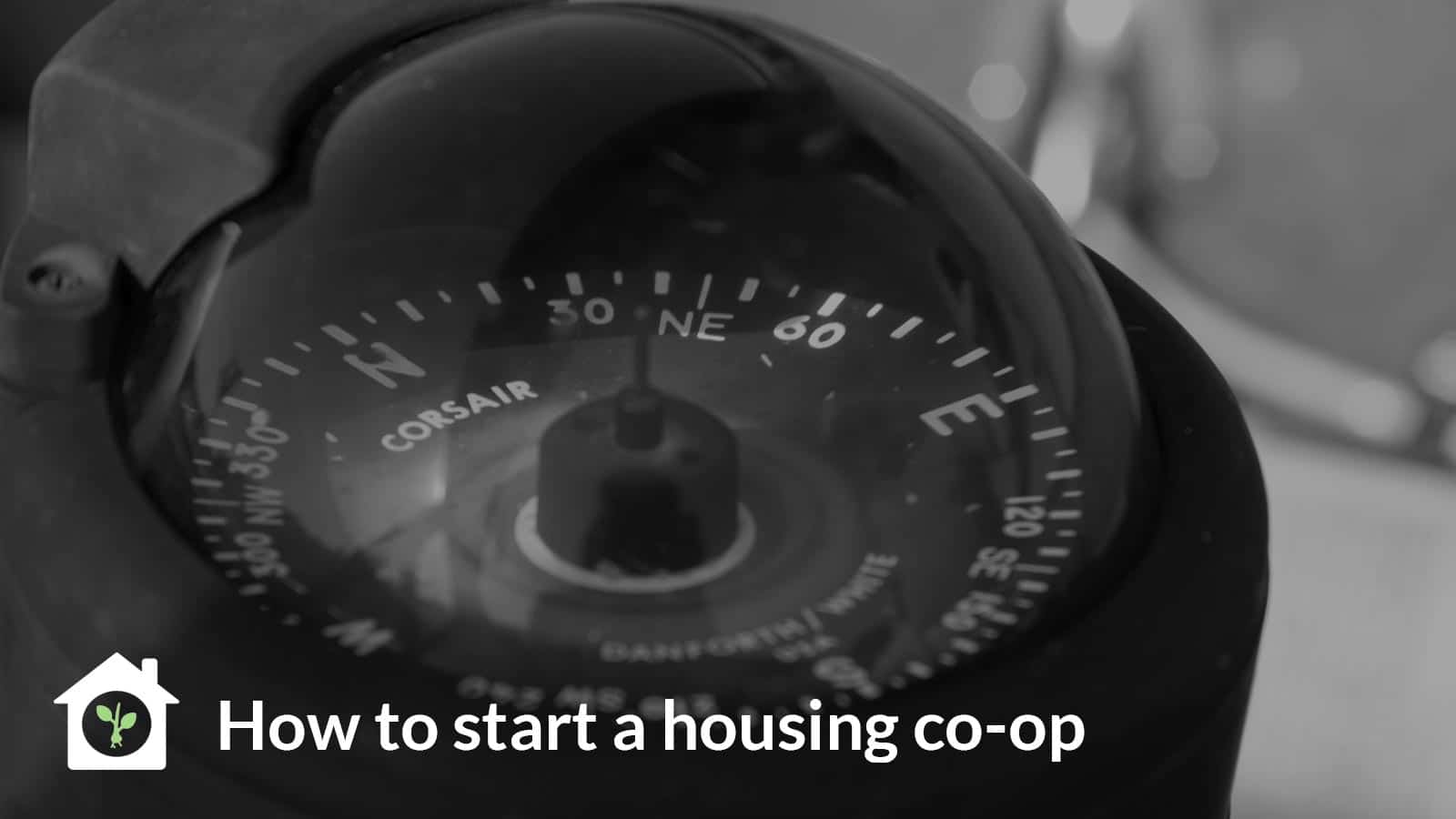
Getting Your Bearings
The Cooperative Association Act (and its Regulation) is the legislation that provides the legal foundation for housing co-ops in BC.
Applications to incorporate a co-op are made through BC Registries, and the documents you submit at this stage determine whether the co-op will be an equity housing co-op or a purely non-profit housing co-op. If you incorporate as a non-profit co-op, the co-op will always remain a non-profit. The law forbids non-profit housing co-ops from redistributing their assets to individual members. Apart from the share purchase price, what members contribute financially to a non-profit housing co-op cannot be returned.
This page outlines the key issues and highlights challenges moving from idea to actual housing. It’s not an easy path, which is why the community housing sector has worked so hard to establish a Community Land Trust. The path is not strictly linear either, so you’ll probably be working on a few items simultaneously.
Photo credit: “Which direction?” by Andrew Malone used by CC BY 2.0. Original image was cropped and toned with text added.
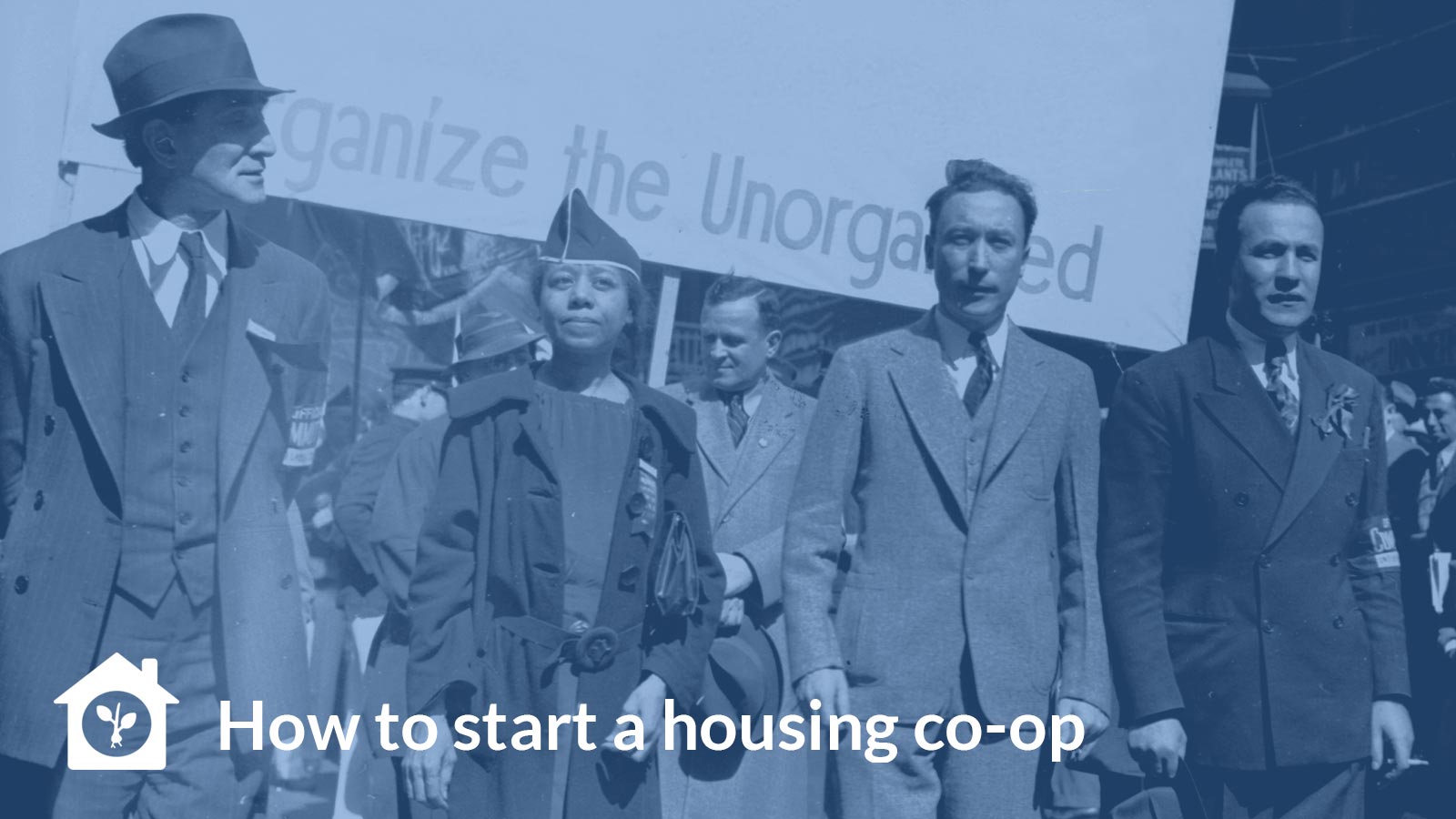
Create Your Core Group
To incorporate a co-op, you need at least three persons. You’ll also benefit from sharing the work involved and setting a direction. Begin by discussing some basic issues and the hopes you have.
- Why use the co-op model? (Why not form a society, for example? Or a company? Does your group support all of the international co-op principles? Is a co-op the best fit for your goals?)
- Brainstorm names for the potential co-op. (Research whether your preferred name is available. If it is, consider reserving it now in advance of your incorporation.)
Understanding the benefits and requirements of the co-op model is critical. You may find general information through the BC Coop Association and the International Co-operative Alliance. Canadian co-op housing federations are also excellent sources.
Photo credit: “Edith Ransom and Charles Zimmerman (center) of ILGWU Local 22 march with others in the 1937 May Day parade” by Kheel Center, used by CC BY 2.0. Original cropped and toned with text added and part of sign erased.

Clarify Your Purpose and Available Resources
Clarifying your mission is critical. It will help you figure out the resources you’re going to need and what gaps (if any) exist.
- What does the neighbourhood need? (Conduct a needs assessment: local market/demand.)
- Is providing housing your primary goal? (Or are you interested in sustainable communities, or supportive services?)
- Articulate a strategic vision and objectives.
- Is the goal to provide land for housing only, or land and housing? Green housing? Co-housing?
- Are you aiming to build or acquire existing housing?
- Review assets: how will you find money and land? (Consider both equity contributions and borrowing.)
- Consider partnering with other active organizations or a community land trust.
Whether for your own purposes or to have conversations with others, you need to be able to clearly express your goals and where you fit in with the needs of your neighbourhood and potential members. Realistically assessing what resources you can draw on is important. If you don’t have money, or land, or experience developing housing, working with others is the most practical way forward.

Choose Economic Model
Non-profit co-ops usually need a government partner. Without it, equity contributions from members can provide the resources the co-op needs. The wishes (and capacity) of the core members matter a lot here.
- Which model best fits with the core members’ hopes and expectations?
- Do the core members have the financial capacity to make significant equity contributions?
- Are government partners or philanthropic donors available?
Between the mid-1970s and the early 1990s, the federal government offered supports for non-profit co-op housing (both in terms of development and promises of long-term subsidies to make the housing more affordable). That kind of assistance is less available, so the financial capability of potential members matters more now that it did in the past. Combine that with large increases in land and construction costs: creating new co-ops is challenging for new and small groups. In 2024, CMHC introduced its Co-op Housing Development Program which promises new support but with significant eligibility requirements.
Photo credit: “Mann zieht Bauer nach vorne” by Marco Verch used by CC BY 2.0. Original image was straightened, cropped and toned with text added.

Consultants and Advisors
Autonomy is a co-op principle, but that doesn’t mean you must (or can!) do things on your own. You’ll likely need to seek expertise in the broader community.
- Seek potential (development) consultant help?
- See potential lawyer with required experience.*
- Consider outreach to sector groups.
- Look at potential Rules and Occupancy Agreement needs.
- Investigate pre-development funding and conduct a viability study.
- Do first analysis to determine whether your model is feasible.
The help you need will depend on what you plan to do. Acquiring an existing building is less complicated than developing a new building on an empty site, but lawyers are needed for both. Financial modelling is critical to get a sense of whether your project has a chance to succeed. It’s also necessary if you’re hoping to borrow money or apply for grants from potential funders.
* Would also include possible accountants, marketing consultants, etc.
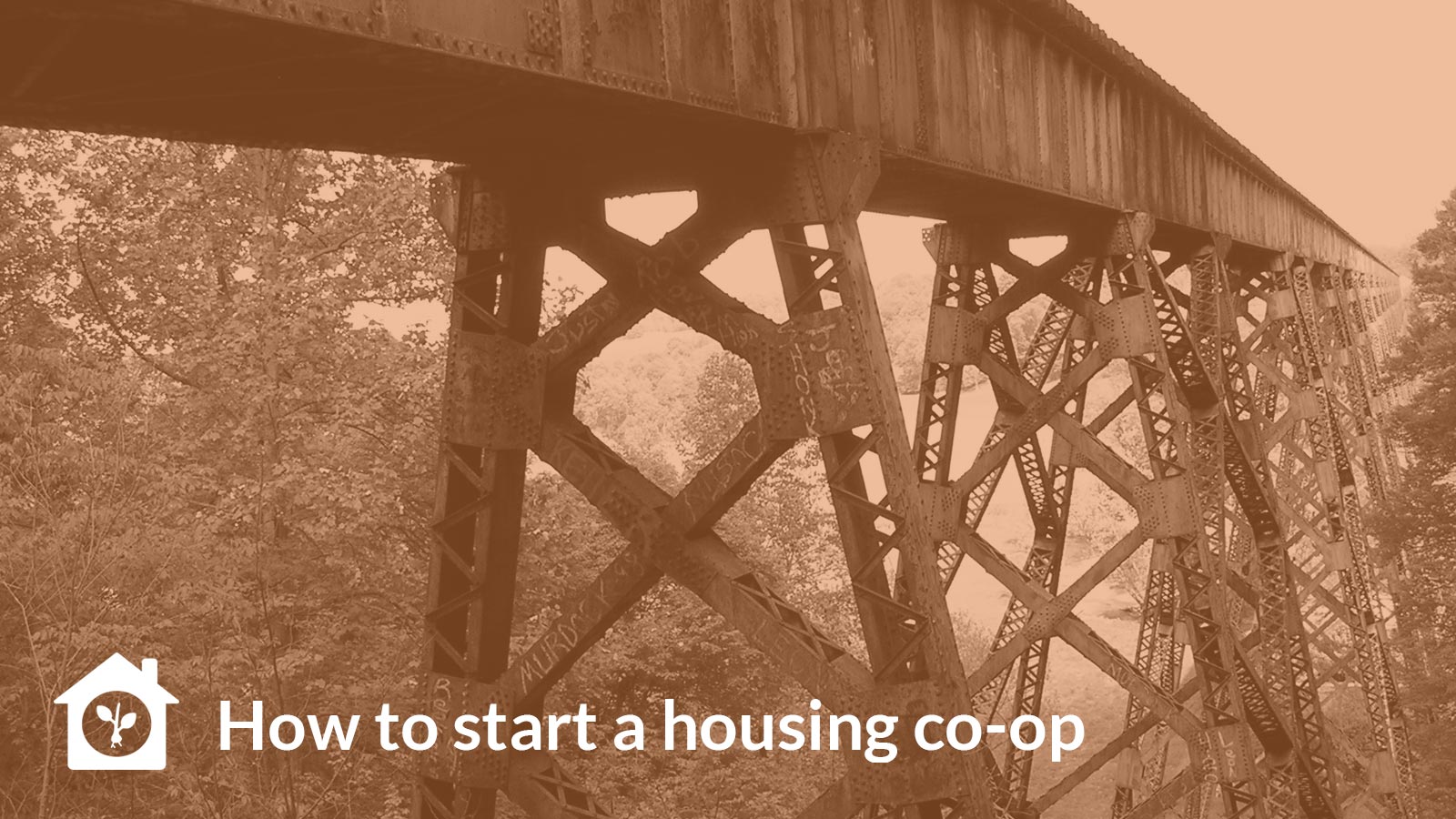
Investigate External Support
Government programs may exist to assist. This is especially important for non-profit co-ops. Expect that assistance will come with obligations, often around affordability.
- Investigate pre-development funding, if appropriate
- CMCH Seed Funding
- BC Housing Project Development Fund
- Vancity early-stage grants and pre-construction loans
- CMHC’s Co-op Housing Development Program
- CMHC’s Affordable Housing Program (New Construction Stream), previously the Co-investment Fund.
- Explore whether your project might be eligible to submit an RFP to the Building BC Community Housing Fund
- BC Housing (and its Housing Hub)
- Investigate potential financing (loans and grants) through regular commercial borrowing
Note that funders traditionally support organizations that have experience. They also have policy goals they are hoping to achieve around matters of affordability, accessibility, energy-efficiency and more. If you seek funding you may need to ensure that these external goals can be met.
Equity co-ops will have less access to support, but will have more independence from rules set by others.
Photo credit: “supports” by Eli Duke used by CC BY-SA 2.0. Original image was cropped and toned with text added.
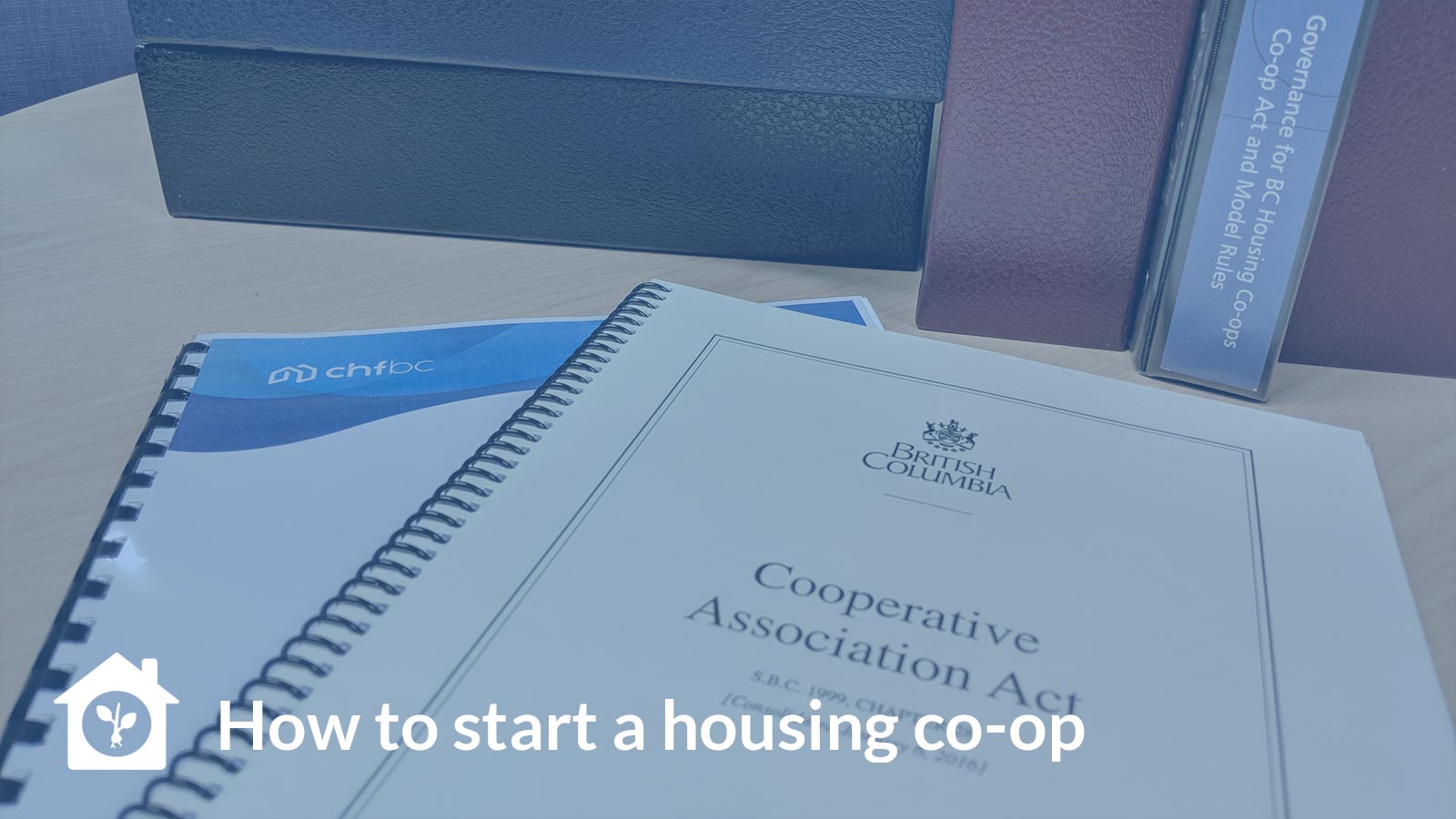
Core Group Preparations
With more information, the core group is better positioned to make more decisions and finalize preparations for incorporation.
- Consider the co-op’s needs:
- what form should the co-op Rules take?
- what policies will the co-op need to run smoothly and meet its mission?
- Assign tasks/responsibilities to group members.
Before incorporation, you’ll need to decide between an equity or non-profit model and develop an appropriate incorporation package. If you haven’t done so already, now is the time to settle on an available legal name for your co-op.
At the beginning, your co-op’s need for policies (beyond the rules established by legislation or the co-op’s formal Rules and Occupancy agreement) is minimal. But you may want to put some effort into thinking what policies you’ll need later on. Are you planning to have a non-smoking building? Allow pets? Restrictions on entry to the co-op based on finances? Clarifying these ideas now may save you trouble later. CHF BC members can access model policies on our website.
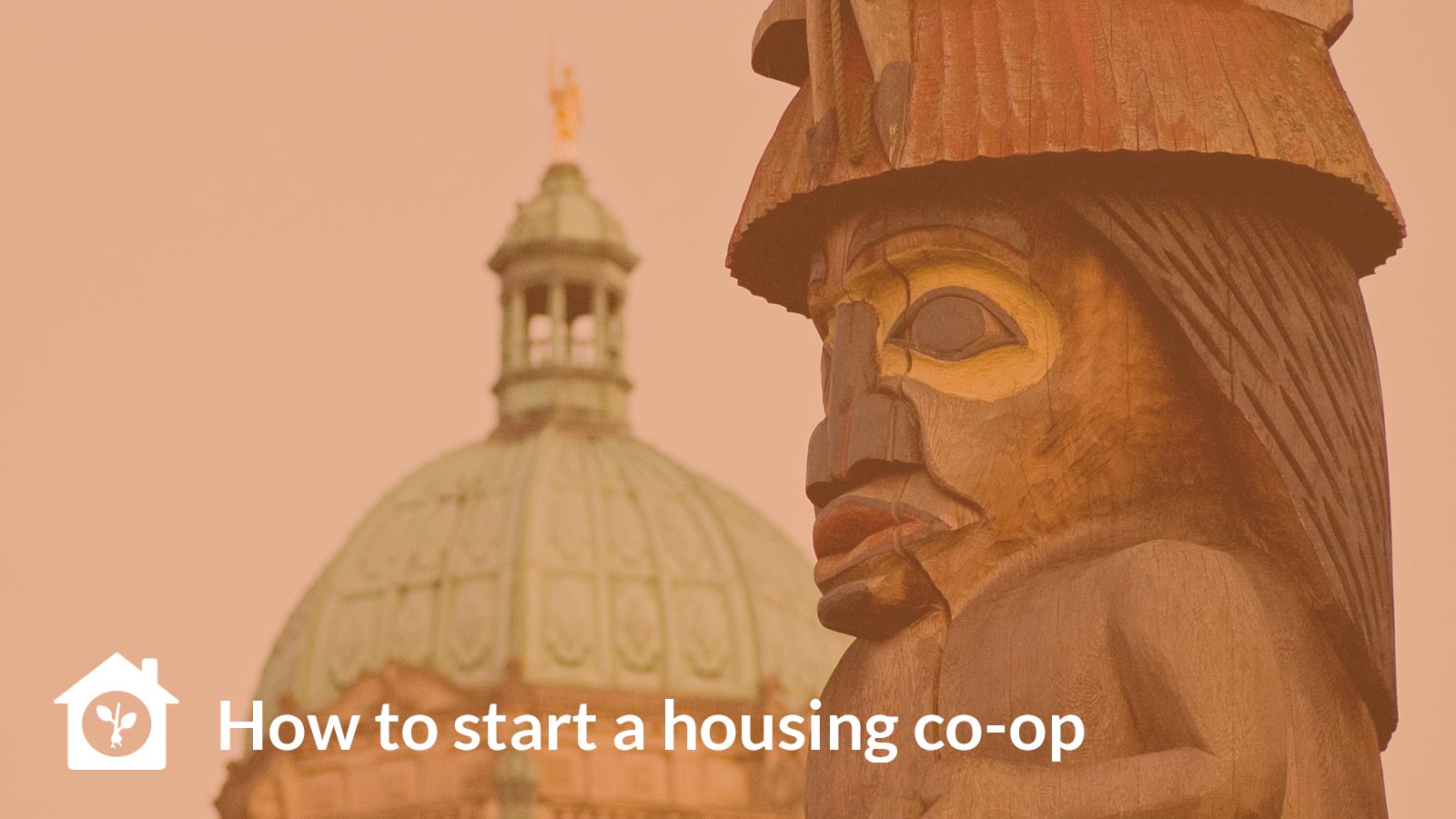
Incorporate!
Incorporation is a provincial matter (unless your co-op operates across provincial borders like CHF Canada). In BC, housing co-ops are incorporated under the framework provided by the Cooperative Association Act.
- Reserve your co-op’s name (if you haven’t already).
- Confirm non-profit vs equity model.
- Create a Memorandum of Association appropriate to your co-op type.
- Prepare List of First Directors (with contact information) and Notice of Registered Office.
- File incorporation documents with BC Registry Services. Remember to:
- Sign and witness documents
- Include appropriate fees
Always check BC Registry Services for the most up-to-date instructions and forms. We have some sample Memoranda of Association for equity housing co-ops and for non-profit housing co-ops. CHF BC offers Model Rules for its members, which may be used of co-ops of either type. (The standard co-op rules referenced in the Act are not suitable for housing co-ops.)
Photo credit: “Totem Before Legislature” by Stewart Butterfield by CC BY 2.0. Original image was cropped and toned with text added.
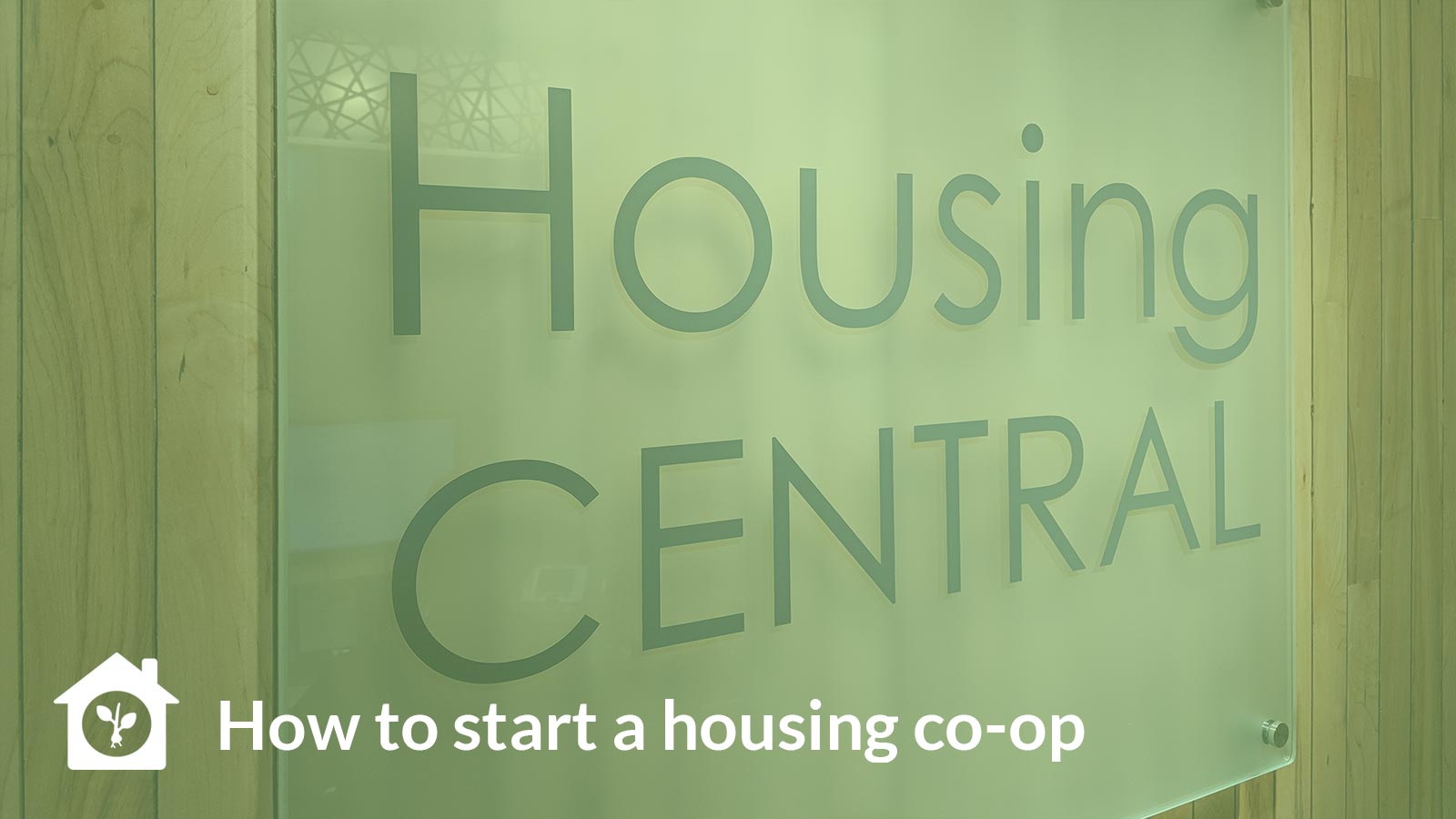
Join Sector Organizations
Sector groups provide information and advice and advocate for housing co-ops. Housing co-ops (and their members) may benefit from group buying and insurance programs.
- Join CHF BC. You’ll be able to access the federation’s education programs, co-op services and group buying savings.
- CHF BC offers lawyer-approved and Act-compliant Model Rules. You may want to revisit your own co-op’s rules so they align with the Model Rules.
- Join CHF Canada for advocacy support and access to insurance services.
Co-operation among co-ops is one of the core co-op principles. CHF BC and CHF Canada are both incorporated as co-ops and exist to serve their members. In BC, the support and educational opportunities they offer are complemented through partnerships in Housing Central.
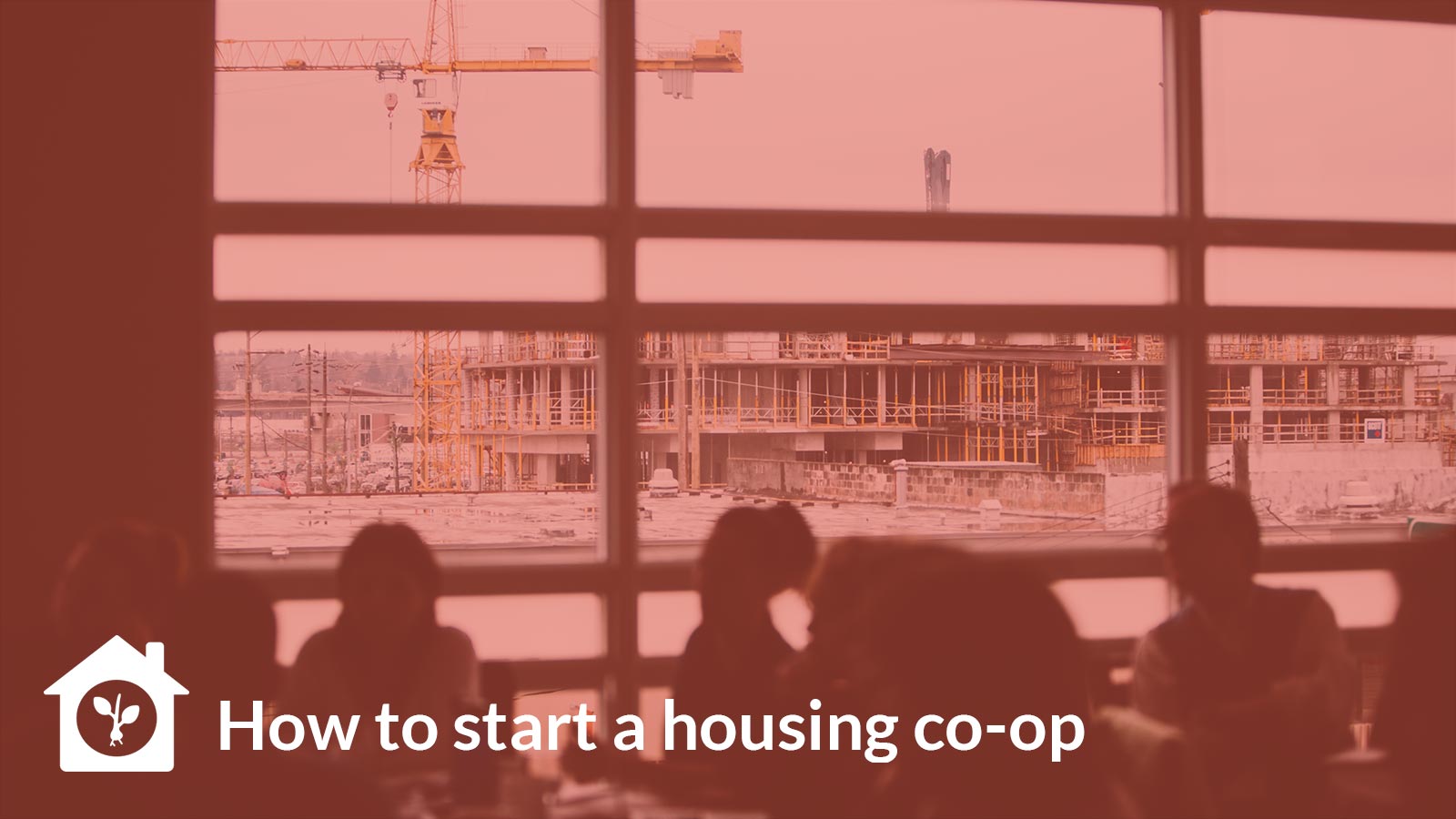
Implementation: Build or Acquire
It's a single entry at the end of the list, but this is a huge part of the process and it will be different for each co-op.
- Activities may include land or building acquisition, (building conversion) and new construction, as well as associated loan and grant applications.
- Once your co-op incorporates, it will have ongoing reporting responsibilities. Keep an eye on when you need to hold annual meetings, and be sure to file annual reports to maintain your status.
This step may take several years, depending on your group’s readiness and resources. New construction will involve a team of professionals and contractors and will almost certainly bring surprises and take longer than you hope. Acquisitions will face potential requirements for building upgrades. Be sure to select your team well and ensure they have the experience and expertise you need.

Rental Protection Fund
In January 2023, the Province of BC announced a $500 million fund to help protect affordable rental stock.
The Rental Protection Fund was designed to enable non-profit housing operators to acquire existing rental buildings and preserve their affordability. Non-profit societies and non-profit housing co-ops would be eligible to access the Fund which is jointly administered by BC Non-Profit Housing Association, the Aboriginal Housing Management Association and the Co-operative Housing Federation of BC.
This may represent a new source of support for creating or expanding non-profit co-op homes, but will will not eliminate the need for significant applicant capacity and resources.